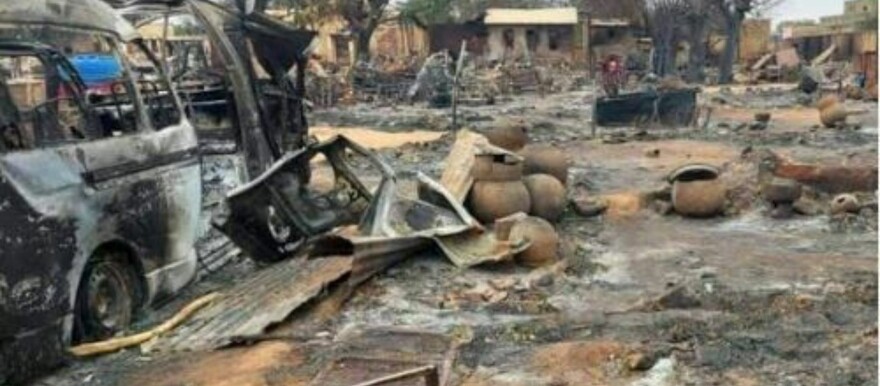Several UN agencies on Friday at a Geneva press briefing said they are concerned about the worsening state of affairs in Sudan occasioned by the war between the Sudan Armed Forces (SAF) and Rapid Support Forces (RSF) which has been ongoing for a year now.
Rolando Gómez, Chief of the Press and External Relations Section at the United Nations Information Service in Geneva, chaired a hybrid briefing which was attended by the spokespersons and representatives of the World Health Organization, the International Telecommunication Union, the United Nations Refugee Agency, the Office for the Coordination of Humanitarian Affairs, the International Organization for Migration, and the United Nations Human Rights.
Ravina Shamdasani, for the United Nations Human Rights Office (OHCHR), stated that the UN High Commissioner for Human Rights, Volker Türk, was horrified by the escalating violence in El-Fasher, where hostilities between the SAF and RSF were having a deeply devastating toll on civilians. At least 58 civilians were reported to have been killed and 213 others injured in El-Fasher since fighting dramatically escalated in the North Darfur town the previous week.
Türk urged both leading generals [Abdel Fattah al-Burhan, leader of the Sudanese Armed Forces, and Mohamed Hamdan Dagalo, head of the paramilitary Rapid Support Forces] to act immediately – and publicly – to de-escalate the situation. He also called on them to put aside entrenched positions and take specific, concrete steps to cease hostilities and to ensure the effective protection of civilians, as was their obligation under international human rights law and international humanitarian law, and consistent with their commitments under the Jeddah Declaration, agreed in May 2023.
The High Commissioner warned both commanders that fighting in El-Fasher, where more than 1.8 million residents and internally displaced people were currently encircled and at imminent risk of famine, would have a catastrophic impact on civilians, and would deepen intercommunal conflict with disastrous humanitarian consequences. He reminded the commanders of their obligations under international humanitarian law to ensure strict compliance with the principles of distinction, proportionality, and precaution and to put an end to any ongoing violations.
Meanwhile, Jens Laerke, for the Office for the Coordination of Humanitarian Affairs (OCHA), stressed that in Sudan, half of the population, or 25 million people, needed humanitarian aid.
“Famine was closing in; diseases were closing in; the fighting was closing in on civilians, especially in Darfur. Collectively, the humanitarians asked for USD 2.7 billion, but as of today, they had received just 12 percent of that,” he said. “This was a catastrophically underfunded appeal. Without more resources coming in fast, humanitarian organizations would not be able to scale up in time to stave off famine and prevent further deprivation. Now was the time for donors to make good on pledges made, step up and help us help Sudan and be part of changing the current trajectory that’s leading toward the cliff’s edge.”
For his part, Dr. Shible Sahbani, the World Health Organization (WHO) Representative in Sudan, speaking from Port Sudan, said that some 17 percent of the population were now displaced in what was the largest displacement crisis in the world. Close to 16,000 people had died due to the ongoing war, and 33,000 had been injured, but the real toll of the war was probably much higher. The recent escalation of violence in Darfur, particularly in Al Fasher, was alarming and causing more deaths and injuries among civilians as access to health facilities was hampered by the ensuing insecurity.
“Both the displaced and those that had remained in their localities lacked access to necessities like food, water, healthcare, and medicines while disease outbreaks like cholera, measles, dengue fever, and malaria are spreading. Currently, two-thirds of Sudan’s 18 states were experiencing multiple outbreaks,” he stated. “WHO is particularly concerned over the lack of treatment for people suffering from chronic conditions, such as diabetes, hypertension, heart disease, and kidney failure. The lack of access to basic healthcare and medicines is putting their lives at risk in a country where there was a high burden of non-communicable diseases.”
On top of that, famine was looming, warned Dr. Sahbani, especially in parts of Darfur and in Khartoum, with more than one-third of the population facing acute hunger.
Attacks on healthcare and humanitarian workers worsened the lack of access to health services, said Dr. Sahbani, and put patients, health workers, humanitarian workers, and humanitarian assets at grave risk. WHO has thus far recorded 62 verified attacks on healthcare. Despite the challenges, the resolve WHO to respond to the health emergency remained intact. WHO delivered into Sudan over 1,200 metric tons of medical supplies to health facilities across Sudan’s states by air and through cross-border and cross-line mechanisms, provided key equipment to sustain laboratory services, improve ICU care, and enhance infection prevention and control, supported vaccination campaigns to respond to outbreaks of cholera, measles, and polio, and trained health workers in case management of epidemic-prone diseases in a crisis setting, and in management of severe malnutrition. WHO called on parties to the conflict to silence the guns and give the people of Sudan respite. Health could not be ensured in the absence of peace.
Rolando Gómez, for the United Nations Information Service (UNIS), reminded that in his address to the Summit of the League of Arab States the previous day, the Secretary-General had urged the international community to intensify its push for peace and call on the warring parties to agree on a lasting ceasefire. This should be followed by a political process that includes women’s and youth groups. He pledged the full support of the United Nations.




